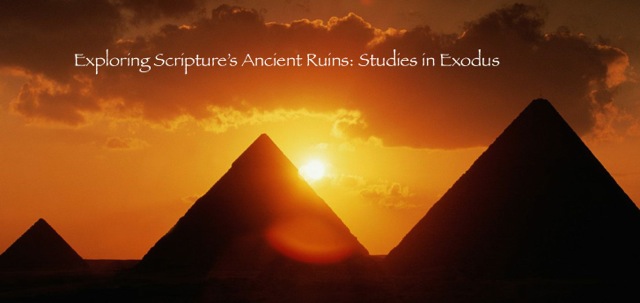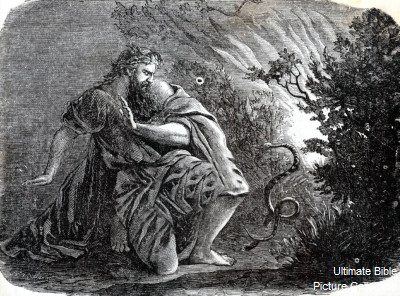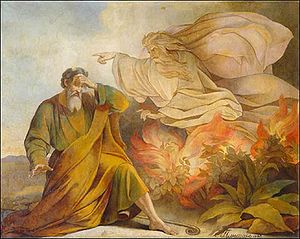Monthly Archives: September 2014
Exodus 4:1-17 Overcoming the Excuses 9-21-14
Ex 3:12ff “I am” 9-14-14
©2003-2014
Fellowship
Life of Moses
Lesson 6
I AM
Ex 3:12ff
(Edited 9.14.14)
Introduction: You make a mistake, perhaps even a huge mistake; you think your life has changed forever–that there is no going back. In exile, you take the flock of sheep you shepherd and which you have been pasturing for the past forty years to an out-of-the-way desert valley that seems to symbolize your exiled existence. You see something strange in the distance—it’s a fire…a fire that refuses to die out. You decide to go over and take a closer look. As you draw closer to this inextinguishable flame, you experience something that will change your life forever—you experience the presence of God… God. Nothing will ever be the same again. Praise be to God.
What has just happened? The God of the universe has plucked YOU, out of all the people on the planet–a wandering, lonely, exiled, imperfect shepherd–to free an entire nation of over two million Spiritually straying sheep or human slaves from a much more greater nation that does NOT intend to just allow you to walk in and then just walk out of the door with two million slave workers, and then, once God has somehow empowered or used you to free these people, to now lead or shepherd them across a vast desert wasteland with little food or water resources to a land that is flowing with milk and honey…a land that only a few of their forefathers briefly occupied almost seven centuries before… and a land that is currently occupied by wicked people that have no intention of just handing, what they believe to be their land, back over to you.
Impossible, you say? Ridiculous? Sounds utterly insane, if you ask me, unless the God of Creation is the one doing the calling AND the work. Do you have the guts to be obedient, to trust, to put one foot in front of of the other… no matter what and no matter the price?
I write all this only to encourage all of you NOT to minimize what is about to take place here. This undertaking is of gargantuan proportions. And yet, our faith, born in heaven, is a faith of gargantuan implications. If God could do this with Moses, what might he still have planned for you?
Special Note: Notice that I AM WHO I AM as well as LORD are in all caps in the NIV. Why is this? See note below*.
Pray
Context…
Ex. 3:1 Now Moses was pasturing the flock of Jethro his father-in-law, the priest of Midian; and he led the flock to the west side of the wilderness and came to Horeb, the mountain of God.
2 The angel of the Lord appeared to him in a blazing fire from the midst of a bush; and he looked, and behold, the bush was burning with fire, yet the bush was not consumed.
3 So Moses said, “I must turn aside now and see this marvelous sight, why the bush is not burned up.”
4 When the Lord saw that he turned aside to look, God called to him from the midst of the bush and said, “Moses, Moses!” And he said, “Here I am.”
5 Then He said, “Do not come near here; remove your sandals from your feet, for the place on which you are standing is holy ground.” 6 He said also, “I am the God of your father, the God of Abraham, the God of Isaac, and the God of Jacob.” Then Moses hid his face, for he was afraid to look at God.
7 The Lord said, “I have surely seen the affliction of My people who are in Egypt, and have given heed to their cry because of their taskmasters, for I am aware of their sufferings. 8 So I have come down to deliver them from the power of the Egyptians, and to bring them up from that land to a good and spacious land, to a land flowing with milk and honey, to the place of the Canaanite and the Hittite and the Amorite and the Perizzite and the Hivite and the Jebusite.
9 Now, behold, the cry of the sons of Israel has come to Me; furthermore, I have seen the oppression with which the Egyptians are oppressing them. 10 Therefore, come now, and I will send you to Pharaoh, so that you may bring My people, the sons of Israel, out of Egypt.”
11 But Moses said to God, “Who am I, that I should go to Pharaoh, and that I should bring the sons of Israel out of Egypt?”
Read the Passage three times…
12 And God said, “I will be with you.
And this will be the sign to you
that it is I who have sent you:
When you have brought the people out of Egypt,
you will worship God on this mountain.”
Why does God say this? What just came before in the text? Moses’ doubts—albeit reasonable ones? How is this a sign—if we make it this far, then you know I was the one who did it and I was the one with you pulling off this incredible miracle?
13 Moses said to God,
“Suppose I go to the Israelites and say to them,
`The God of your fathers has sent me to you,’
and they ask me, `What is his name?’
Then what shall I tell them?”
Why is the name important? Did they not have a name for God before? What did they call him? What was their worship like? How did they distinguish it from all the other pagan religions and idol worship? What does the name signify to the Israelites?
14 God said to Moses, “I AM WHO I AM.
This is what you are to say to the Israelites:
`I AM has sent me to you.’”
What does this mean? I don’t have a name or I don’t have to answer the question—“I am who I am”? That “I AM”? That “I exist”? That “I am not silent”? That I do communicate? That I do lead? That I am involved in the affairs of men? That I do intervene? That I do have a purpose? It is almost as if to say, “Before you did not know me real well, but now I am revealing myself very specifically…as I have done in creation, as I have done to your forefathers in promising them the land that I am about to take you back to…as I have done in building this nation of several million people out of one man, your father, Abraham.”
It is like Moses is supposed to say, “Guess what folks. He is alive. He does exist. And he is about to do something important. Something that will never be forgotten. A timeless event.”
15 God also said to Moses, “Say to the Israelites,
`The LORD, the God of your fathers
–the God of Abraham, the God of Isaac
and the God of Jacob
–has sent me to you.’
This is my name forever,
the name by which I am to be remembered
from generation to generation.
Now he connects himself to their forefathers. In the previous verse it was his self-existence. Now it is that he has done business in the past with their forefathers. That they have a purpose. That this is no accident that they are slaves in Egypt. This was also a part of the plan. Now I have something else for you. We are about to take another step, just as each of us who knows and accepts God as our Savior has an integral part of the plan in God’s universal purpose.
*Special Note on LORD: The reason for this is that both phrases or words are one in the same. LORD in all caps becomes a substitute for I AM (or Yahweh, pronounced Yah-way, in Hebrew) for God’s personal name. That is why we call him LORD. When “Lord” is not in all caps, it is the Hebrew word for “master” (adonai).
Why LORD for I AM? Good question. Because God’s personal name, I AM or Yahweh, was considered sacred and not to be taken in vain (Ex 20, one of the ten commandments), scribes substituted the vowels for “Lord or master” (adonai) underneath the consonants for the Yahweh (I AM) within the biblical text since there were no vowels to begin with (Jews did not need them; we did). Rabbi’s knew they were to substitute “adonai,” Lord, for “Yahweh,” I AM, thus not profaning the LORD’s name. But what we, later readers did was to come up with an entirely new word, one that did not really exist, one that combines the consonants of Yahweh with the vowels of adonai–Jehovah.
In fact, for the most part, I will seldom use it. It does not really exist. We have made it up. Either use LORD (Yahweh, I AM ) or Lord (adonai, master or Lord).
So now you know why LORD is in all caps. Remember it stand for I AM or Yahweh, God’s personal name, just like my personal name is Joe or Joseph.
16 “Go, assemble the elders of Israel
and say to them,
`The LORD, the God of your fathers –
-the God of Abraham, Isaac and Jacob—
appeared to me and said:
I have watched over you
and have seen what has been done
to you in Egypt.
Why does he restate this? (By the way the word for Lord here is the same word for I AM—Yahweh.) Why did Yahweh or I AM wait so long? Why did he allow the Israelites to suffer under a merciless king?
17 And I have promised to bring you
up out of your misery in Egypt
into the land of the Canaanites, Hittites, Amorites, Perizzites, Hivites and Jebusites
–a land flowing with milk and honey.’
When did he promise to do this? A long time ago? Who are all these people? Good or bad? Why milk and honey? Prosperity? What was the big deal about milk and honey? Were these luxuries? What did this say about the land? Why would these other peoples who were there share or give it up? This doesn’t sound fair. Sounds kind of like today with respect to the Palestinians being displaced and wanting a land of their own? Sounds like some things never change. And yet this has not always been the case. The Jews have only really been back in the land for the last 50-100 years. Before that it was occupied by many different people, including Muslims, Arabs, Christians and yes some Jews. After the destruction of the temple and Jerusalem in AD 70 by the Romans, the Jewish people for the most part have been displaced and wandering.
18 “The elders of Israel will listen to you.
Then you and the elders are to go to the king of Egypt
and say to him, `The LORD, the God of the Hebrews,
has met with us.
Let us take a three-day journey into the desert
to offer sacrifices to the LORD our God.’
How far will a three-day journey take them? To this mountain? Why will the king of Egypt let them go? What will he use for slaves to build his storehouses?
19 But I know that the king of Egypt will not let you go
unless a mighty hand compels him.
20 So I will stretch out my hand
and strike the Egyptians with all the wonders
that I will perform among them.
After that, he will let you go.
21 “And I will make the Egyptians favorably disposed
toward this people,
so that when you leave
you will not go empty-handed.
22 Every woman is to ask her neighbor and any woman
living in her house
for articles of silver and gold and for clothing,
which you will put on your sons and daughters.
And so you will plunder the Egyptians.”
Jewish women? Why would they have Egyptian women living in their home?
Ask questions…
Whos? God, I , you, the people, Moses, Israelites, your fathers, me, I AM WHO I AM, Abraham, Isaac, Jacob, generation to generation, elders of Israel, Lord, the God of your fathers, Canaanites, Hittites, Amorites, Perizzites, Hivites, Jebusites, king of Egypt, Hebrews, Lord our God, the Egyptians, every woman, her neighbor, any woman living in her house
Wheres? with you, out of Egypt, on this mountain, to you, to you, to you, in Egypt, the land of Canaanites…, into the desert, in her house
Whens? When you have brought the people out of Egypt, then what shall I say, forever, from generation to generation, then you and the elders, three-day journey, will (future), when you leave
Whats?
(Review) Bottom line…vv. 1-11 God calls Moses for the mission of his life—to deliver the people of Israel from Egypt and to take them back to the land, which was promised to their forefathers.
Summary…vv. 12-22
• God tells Moses he will be with him in answer to his question of v. 11 “Who am I to do such a momentous task?”.
• God gives Moses a sign, you will come back to worship at this same mountain with the entire nation.
• Moses’ ask by what name (or authority) is he to lead the Israelites?
• God answers, “I AM WHO I AM.”
• God also answers that the I AM (LORD) of their forefathers is sending Moses..
• God also tells Moses that this is the name that he is to be forever remembered by.
• God also tells Moses to tell the assembled elders that God has seen their plight within Egypt.
• God also tells Moses to tell them that he has promised to return them to their rich Promised Land.
• God also tells Moses that the elders will listen, and that they are to go together to the king of Egypt and ask to leave on a three-day journey into the desert to sacrifice to their God.
• He also knows that Pharaoh will not let them leave unless compelled to by force.
• So God will compel the king of Egypt to release them via his mighty miracles.
• He will also make the Egyptians favorably disposed to the Israelites when they leave so they will not go empty-handed.
Summary….God not only answers Moses’ question that he will be with him to help him accomplish the mission God has given him, he tells him his eternal name and gives him the message he is to take of freedom for the Israelites from the hand of the Egyptians via God’s mighty hand. They will also not leave empty-handed.
Bottom line… I AM WHO I AM will accomplish this great miracle of releasing the Israelites from the Egyptians, now fully supplied for their journey back to their rich ancestral Promised Land.
Whys? What do I learn about God? Life? People? Myself?
• God is with his servants for the tasks he has given them. He does not leave them alone.
• He is also not ignorant of his people’s plight.
• As demonstrated in his name, God is eternally self-existent. He has always existed and always will. He has no beginning and no end. He exists outside of time and space.
• He is involved in the affairs of man; in fact, he has plans for man.
• He desires to bless us and to bring us to his rich Promise Land, and, if not fully here, then certainly in heaven.
• God is more powerful than man. Man ultimately changes, as Pharaoh will do, because of God’s power and intervention.
• God wonderfully provides for his people or children. He does not send us out upon our long journey empty-handed.
• Our hope, or salvation…everyone’s hope and salvation is to trust and worship God.
So What’s? (Prayerfully connect a specific personal struggle to one of the above truths or principles and be willing to share or confess it with the group.)
2002 Application…
This week’s struggle: Getting ready for my message on Sunday. I was becoming burnt out just before Christmas. After Scrooge, I had pretty much shot my wad, so I got a late start for the next Sunday.
We survived and got the message across:
Just as no one could have predicted the destinies of Bethlehem and Jerusalem…that one village (Bethlehem) which lived in the shadow of the other (Jerusalem) would be exalted in such a manner that it was chosen as the Messiah’s birthplace, while the other (Jerusalem) would fall, having been completely destroyed by the Babylonians (as predicted in Micah 5)…we DON’T KNOW our futures!
Therefore don’t compare your life situation to another’s, especially at Christmas time with all the accompanying travel plans, decorating, gift-giving and family pressures etc.
But while the idea was good, apparently I felt I did a poor job of execution because I was not as prepared as I needed to be. I was just hanging on by the skin of my teeth and fatigued for whatever reason.
I would like to do a better job this Sunday. God has called me to this task, whether I feel adequate or not, and quite often I do not. The pressure to not waste people’s time or bore them or to exalt the Word and my Father to others does build from time to time.
Enough of my whining.
Principle/Application: God will be with me this weekend as I finish preparing for Sunday. He desires to richly provide for me and not leave me empty-handed. I have gotten a good jump on the passage. It is now the finishing up–the editing and presentation parts that usually cause me pressure and fear. Therefore, I will trust I AM WHO I AM, Creator Sovereign of the Universe. If he can create this incredible planet and universe with all its order and diversity, certainly he can help continue to perfect my craft, no matter how handicapped and inadequate I feel in the final presentation portions of my teaching. I can and will trust him for the applications/illustrations, their arrangement and development within the teaching.
This also can carry over into finishing building the church, as well as, seeking to lead the church towards the task of increasing staff and ultimately putting into print many of these ideas and basic fundamentals I seem to keep pounding from the pulpit, such as “Rekindling Relationships”, “Bible Study Methods”, and the “Purpose of a Church.”
So just take a deep breath and go in the name of I AM, and by putting one foot in front of the I will go back to Egypt and do the seemingly impossible…the difficult.
Your Son, LORD
2014 Thoughts… Wow! While those previous paragraphs are pretty much par for the course…I mean I could have said that about last Sunday, that next to the last paragraph was a bit humbling. We did finish the church; staff was increased, and then we went backward staff-wise and with new help, 12 years later, I am taking another run at putting these “fundamentals” into print. What can I say? Some things are more difficult than we think, and life often has us taking two steps back, after our three steps forward. I guess the real question is: Do we quit? Do we give up…when things don’t initially work out as we had hoped? And the answer is…Of course not, if it is of God. And in fact, as it will turn out, even after Moses does leave Egypt with Israel, because of Israel’s foolish choices, the Children of Israel, with their earthly shepherd, Moses, will spend forty years delayed in the desert. Could this have happened to Fellowship, not once, but twice? It would certainly seem so. Are we getting closer each time? I think so. Is this the norm? Oh, I think very much so. We battle fickle, sinful human nature. And human nature, like a deadly cancer is often seldom fully cured. In other words, it comes back. As they say, it only takes one cell. And yet this is the call of God, and somehow in all the madness, the Ships occur and Spiritual Growth occurs. So let’s not get so hung up on the achieving of a goal, as the process of pursuing the goal, because ultimately our goal is Spiritual Growth and God, it would seem, has his own unique ways of bringing this about, despite our flawed attempts to fulfill this same goal in our own very-much flawed human understanding and power.
Your struggle?
Principle?
Prayerful application?
What about your students? What are some of their current struggles?
Which principles seem to relate?
How could God prayerfully apply these truths to their lives? (Just try a few in your preparation…then try leading the application in that direction. It may go another direction. Be sensitive to God’s leading among the group.)
Scripture quotations, unless noted otherwise, are taken from the Holy Bible: New International Version‚ NIV‚ Copyright 1973, 1978, 1984, International Bible Society. Used by permission of Zondervan Bible Publishers. All rights reserved.




